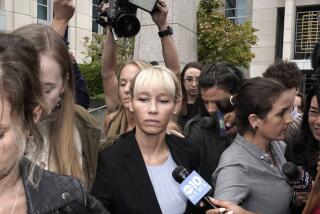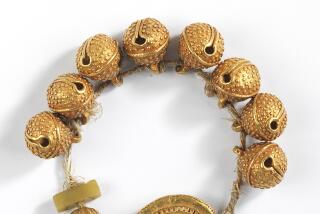Once an aid in a federal probe, antiquities scholar becomes a key target
Third of three parts
On a March visit to the United States from her adopted home in Thailand, antiquities scholar Roxanna Brown met her brother for lunch in Santa Monica.
Roxanna was broke, Fred Brown recalled. She seemed nervous.
For years, she’d chosen to live on a modest salary in a village outside Bangkok, despite her reputation as one of the world’s leading experts on Southeast Asian ceramics. Now 61, she said she could no longer afford the $400 a month she’d been sending to support their 90-year-old mother.
She had her suitcase in the back of her car and was uncertain where she would be sleeping that night, but told her brother she would manage, he said.
Weighing heavily on her mind was a federal smuggling investigation that had made front-page news in Thailand and the U.S.
In January, hundreds of agents had launched coordinated raids on four Southern California museums and other places in California and Illinois. According to federal search warrant affidavits filed at the time, they were looking for evidence of an alleged smuggling pipeline carrying looted Thai antiquities into the U.S. Some of those objects were appraised at inflated values and donated to museums for fraudulent tax write-offs, investigators believed.
Several years before, Roxanna Brown had helped the investigators as an expert and tipster. She knew many of the people named in the affidavits.
There was Robert Olson, referred to in the affidavits as “the smuggler,” in whose warehouse Brown said she had seen human arm bones strung with ancient bronze bracelets.
There were her friends Jonathan and Cari Markell, Asian art dealers in Los Angeles who were alleged to have been at the center of the tax scheme.
And there were her colleagues at local museums, some of whom allegedly turned a blind eye to donations of looted antiquities, according to federal affidavits.
No one had been charged with a crime, but now investigators were trying to reach Brown again -- this time with questions about inflated appraisals that bore her signature.
She confided to her brother that she had allowed the Markells to use her electronic signature on one appraisal that might have been overvalued. Apparently they had used it on other appraisals, but she insisted it was without her permission, Fred Brown said.
“Fred, I have no money. If I were really doing this, wouldn’t I have money?” her brother recalled Roxanna saying. “I don’t know why they are bothering me with something so small. If they harass me, they’re going to ruin my name, and that’s all I have.”
Soon after, Brown cut her trip short and flew back to Thailand.
The Roxanna file
As federal investigators sorted through the massive haul of records they had seized in January, they came across an intriguing file among the documents taken from Olson.
It was labeled simply: “Roxanna.”
Inside were and typed lists in which Brown offered to sell Olson dozens of Thai vessels and other antiquities, according to a search warrant affidavit filed in July.
Investigators now believed that their onetime expert was part of the scheme she had helped them unravel -- that she had peddled the very objects she spent her career protecting.
In one undated document, Brown offered to sell Olson ancient bronze bracelets, Neolithic stone tools and Thai ceramics from “burial sites on the Burmese border,” according to copies of the correspondence attached to the July affidavit.
In an e-mail dated April 2002 that bears her name, she confirmed that she had received $14,000 in cash from Olson for a prehistoric bronze. Two months later, another e-mail from Brown advised Olson’s grandson of a Thai bank account to which additional money could be sent.
Brown’s role in the alleged scheme had continued even after she had helped investigators uncover it, the correspondence suggests.
Agents found an e-mail from June 2006, allegedly an exchange between Brown and Jonathan Markell, in which the scholar provided her electronic signature for his use on appraisals. In another e-mail exchange from March 2007, Markell asked Brown to sign six to eight blank appraisal forms for future donations and offered the scholar $300 “for using you, as it were, as the appraiser. . . .”
“If you are nervous about doing this, please realize that the Republicans are still in office, the IRS does not have enough personnel to review small-time appraisals and the appraisals are very well written and will never be challenged,” Markell wrote, according to a copy of the e-mail filed with the affidavit.
The documents indicate that Brown responded via e-mail the same day: “No problem! I am delighted to be your partner in this.”
Confronted at hotel
On Thursday, May 8, Brown flew to the U.S. to give a lecture at the University of Washington.
She was met by professor Bill Lavely, her host, who dropped her at Seattle’s Watertown Hotel with plans to meet Friday evening for dinner.
On Friday afternoon, the federal agent she had helped four years earlier, accompanied by three other investigators, confronted Brown in her hotel room, according to interviews and the July affidavit.
Their interview is described in the affidavit as follows:
Brown initially denied selling objects to Olson or providing recentappraisals to the Markells.
Then, as the investigators confronted her with their evidence, her story changed. She said she had forgotten about Olson’s $14,000 payment for antiquities and admitted signing blank appraisals for the Markells.
She also acknowledged bringing one Thai and two Burmese Buddha images into the U.S. for the Markells. Because she was a Buddhist, she felt she did not need government permission, she said.
Investigators had been questioning Brown for four hours when Lavely called up to her room from the hotel lobby. After waiting a few minutes, he came upstairs and knocked on her door.
Federal agents soon emerged with Brown and escorted her to the elevator as her bewildered host looked on.
“It’s about that thing in Los Angeles,” Lavely recalled her saying before the elevator doors shut. “I made a mistake. . . . I faxed my signature.”
Brown was arrested and taken to a federal detention center near Seattle’s airport. That afternoon, a Los Angeles grand jury had indicted her on a single count of wire fraud for allowing Jonathan Markell to use her signature on an inflated appraisal.
The Markells have declined to comment through their attorney, citing the ongoing investigation. The alleged smuggler, Olson, has denied wrongdoing.
That weekend in prison, Brown began to suffer from stomach problems. By Monday, she was throwing up as she met with her court-appointed public defender, Michael Filipovic, the attorney recalled.
When he came back later that morning, Brown was sick again with uncontrolled diarrhea. The federal marshals decided she was too ill to attend her court appearance that afternoon, Filipovic said.
The lawyer said he spoke briefly with Joseph Johns, the Los Angeles prosecutor in charge of Brown’s case, who surprised him by saying more charges would be coming. If convicted of them all, Brown faced 36 to 56 months in prison.
Johns would not withdraw the government’s request for Brown’s detention, Filipovic recalls, but said that once she got to Los Angeles, “we probably won’t object to her being released on home detention.”
Johns declined to comment for this story because of pending civil litigation and the ongoing criminal investigation.
In court the next day, at a brief hearing to determine if she could be released on bail, Brown was shaky and in a wheelchair, but looked slightly better, Filipovic said.
Prosecutors described her as a flight risk and danger to the community. Filipovic argued that she had offered to turn in her Thai and American passports and was both ill and handicapped from a long-ago accident.
“As someone said to me, ‘Where’s she gonna run?’ ” Filipovic said. “She’s got one leg!”
Rather than risk losing, Filipovic asked for a one-day delay while the court confirmed that there was someone in Los Angeles who could take Brown in.
“I wish I maybe asked her some more questions and delved a little deeper,” he said in a recent interview.
Later, it would be determined that Brown had suffered a perforated ulcer. The contents of her digestive tract were emptying into the abdomen, causing an acute infection -- a condition that generally requires immediate surgery.
According to a lawsuit filed by Brown’s family, inmates near her cell told a prison guard that she had been vomiting something that “smelled like excrement.” The guard did not respond, the suit alleges, and inmates carried Brown to a shower.
After the 10 p.m. lockdown, inmates allegedly heard Brown call for help. Some began to pray for her.
A guard told Brown she would have to wait until morning for medical attention, the suit says. Prison officials declined to comment, citing the pending litigation.
Roxanna Brown died about 2:30 a.m.. Her final moments were spent in agony, the lawsuit alleges, “laying on the floor of her cell, in her own filth.”
Hundreds of supporters
Brown’s arrest and death stunned and outraged those who had known her throughout her life -- her family in the Midwest, Vietnam War journalists, families in Southeast Asia who had adopted her and Asia scholars who considered her a colleague.
The single criminal charge leveled against her, which was dropped immediately after her death, seemed to contradict everything these people knew about a woman who had chosen a simple life and worked doggedly to protect Asian antiquities.
“It is not only the cruelty of Roxanna’s incarceration we seek to redress, but the slur cast upon her name by the accusations that prompted her arrest,” said a petition to federal authorities signed soon after her death by hundreds of Brown’s friends and colleagues in Europe, Africa, Asia, Australia and the United States.
“For a scholar of such integrity, who tirelessly sought to raise the level of ethical practice in the trade in ceramics, it is a cruel irony that her reputation has been thus tainted.”
Now, as new details of Brown’s role in the alleged scheme come to light, her accusers and admirers are left to sift through the shards of her life.
Whatever emerges from the lawsuit or criminal proceedings, it will be difficult to piece them together smoothly into a single vessel.
More to Read
Start your day right
Sign up for Essential California for news, features and recommendations from the L.A. Times and beyond in your inbox six days a week.
You may occasionally receive promotional content from the Los Angeles Times.






